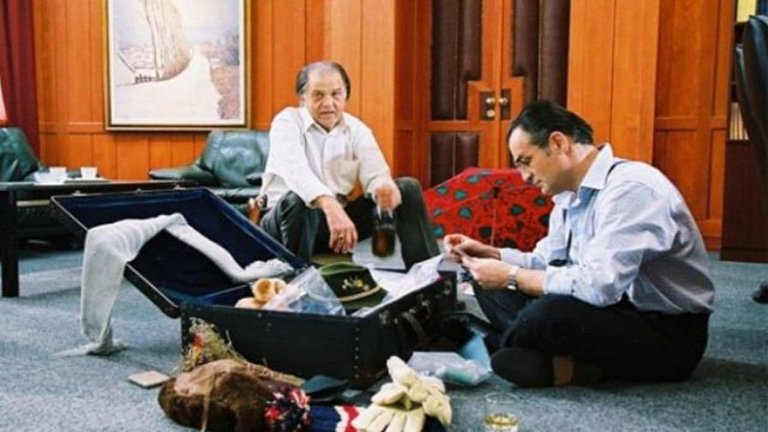Film Review: The Professional (Profesionalac, 2003)

Many of the films made in what used to be Yugoslavia provide rather depressing viewing experience, at least to those familiar with the area and its history. Sometimes it is due to their subject matter, sometimes because of disappointing quality and sometimes because of both, like in the case of The Professional, 2003 Serbian comedy written and directed by Dušan Kovačević.
Kovačević based his film on his eponymous 1990 stage play, one of his most popular works. The setting of the screen adaptation differs from the original and the plot begins with images of October 2000 protests that brought down Serbian authoritarian leader Slobodan Milošević. One of the supporters of that movement was Teodor “Teja” Kraj (played by Branislav Lečić), bohemian pro-Western liberal intellectual. Few months after the revolution, new government has appointed him to run state-owned publishing company, which has recently been plagued by strife among workers, afraid for their jobs due to upcoming privatisation. While trying to handle his dysfunctional subordinates, Teja receives visit from a strange man (played by Bora Todorović) who introduces himself as taxi driver named Luka Laban and originally wants Teja to publish four books of his work. While reading the material Teja discovers that the text is actually dedicated to his life. Laban explains that he is retired agent of State Security Service and that he was tasked with monitoring Teja and his dissident activities. Through flashbacks it is revealed how Laban did that job from almost ten years, thoroughly immersing into his private life without being noticed, and how his relationship, despite ideological differences, evolved from persecutor into some sort of guardian angel.
Kovačević became famous in 1980s due to series of stage works and screenplays in which were often interpreted as the subversion and mockery of Communist Yugoslav regime, most notably his 1984 film Balkan Spy, which had subject similar to The Professional and which, unlike this film, still enjoys cult status in countries of former federation. In this particular case, Kovačević made a mistake by switching the setting from late 1980s, during the twilight years of Communism, into early 21st Century. The intention was to update the film, make it more palatable to younger generations and, more importantly, to foreign audiences that needed convincing that Serbia, shunned over its role in 1990s ethnic butchery, deserved to be brought back into the ranks of “civilised” West after the ouster of its despised dictator. Kovačević tries to put his characters and plot in the context of Serbia’s troubled history from that period by referencing events like March 1991 Belgrade protests, UN sanctions, refugee crisis and 1999 NATO bombing, and even has documentary footage in which Branislav Lečić (who would later become Serbian minister of culture) protests against Milošević’s regime. But all that nevertheless looks artificially inserted into the text that played much better in the context of Communist regime which employed much more crude and efficient methods of political persecution. Even bigger problem is that Kovačević, unlike in Balkan Spy, fails to overcome film’s stage origins. Attempts to lighten up dark realities of traumatised country sometimes results in humour that look forced.
What ultimately holds this film together and make it worthwhile viewing experience is performance by Bora Todorović, grand Serbian actor whose portrayal of Laban represents one of the best roles in his career. His character begins like disdain-worthy government spook only to end as man dediated to his mission and true “professional” with whom audience would ultimately sympathise with. The only flaw in Todorović’s performance is that Todorović serves as replacement for Danilo “Bata” Stojković, even more legendary actor who had played the same character in stage version (and who briefly appears in documentary footage). The rest of the cast, including Lečić, is good, but not too remarkable. The Professional also had music soundtrack written by rock musician Momčilo Bajagić “Bajaga”, whose song “Pada vlada” (“Government Is Falling”) near the end later became source of few Internet memes in countries of former Yugoslavia. It was usually used as illustration of situations when people expected change of their governments, and in most cases change never came or led to something worse. For many who watched this film that made the experience of The Professional even more depressive.
RATING: 5/10 (++)
Blog in Croatian https://draxblog.com
Blog in English https://draxreview.wordpress.com/
InLeo blog https://inleo.io/@drax.leo
InLeo: https://inleo.io/signup?referral=drax.leo
Unstoppable Domains: https://unstoppabledomains.com/?ref=3fc23fc42c1b417
Hiveonboard: https://hiveonboard.com?ref=drax y
Bitcoin Lightning HIVE donations: https://v4v.app/v1/lnurlp/qrcode/drax
Rising Star game: https://www.risingstargame.com?referrer=drax
1Inch: https://1inch.exchange/#/r/0x83823d8CCB74F828148258BB4457642124b1328e
BTC donations: 1EWxiMiP6iiG9rger3NuUSd6HByaxQWafG
ETH donations: 0xB305F144323b99e6f8b1d66f5D7DE78B498C32A7